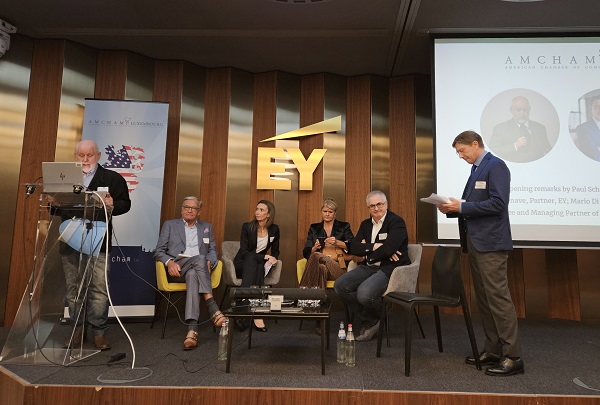 (L-R) Paul Schonenberg (AMCHAM); Laurent Mosar; Sandrine de Vuyst; Aline Muller; Jean-Paul Scheuren; David Arendt (moderator);
Credit: Jazmin Campbell/Chronicle.lu
(L-R) Paul Schonenberg (AMCHAM); Laurent Mosar; Sandrine de Vuyst; Aline Muller; Jean-Paul Scheuren; David Arendt (moderator);
Credit: Jazmin Campbell/Chronicle.lu
On Thursday 10 October 2024, the American Chamber of Commerce in Luxembourg (AMCHAM) held an event dedicated to affordable housing at EY in Luxembourg-Kirchberg.
Organised by AMCHAM's Real Estate Committee, the event featured a panel of experts who explored the various challenges and potential solutions for Luxembourg in terms of affordable housing.
As Paul Schonenberg, Chairman and CEO of AMCHAM, explained in his opening remarks, the focus was on affordable housing solutions for the business community - including young graduates and professionals considering moving to and/or staying in Luxembourg for work. He noted that more than 150 people had registered for the event, thus showing a high level of interest in this topic.
Mario Di Stefano, President of AMCHAM Real Estate Committee and Managing Partner of DSM Avocats à la Cour, added that housing was a fundamental need and right and that, in a wealthy country like Luxembourg, people should have access to housing that is "affordable", "sustainable" and "socially responsible".
David Arendt, an independent director, moderated the panel discussion which brought together Luxembourg MP Laurent Mosar (CSV), Sandrine de Vuyst, member of the management board of Banque Raiffeisen, Aline Muller, CEO of the Luxembourg Institute of Socio-Economic Research (LISER), and Jean-Paul Scheuren, Vice-President of the Luxembourg real estate chamber (CIGDL), as well as Declan Reid, Managing Director at LCM Partners, who joined the event remotely from London.
First up was Aline Muller who presented various facts and figures about housing in Luxembourg. She noted that the housing offer could not keep up with housing demand, adding that there was an increasing gap in terms of affordable housing, which represents less than 2% of the total housing offer. Aline later acknowledged that the issue cannot be solved by only acting on the demand site. She argued that the allocation of land in Luxembourg was "not optimal to foster business development" and stressed the need to collectively allocate land "in a better way", also to help retain talent. Aline also highlighted the value of public-private partnerships.
Laurent Mosar was asked to summarise the government measures to tackle the affordable housing issue, as presented recently in the 2025 state budget. These notably include halving registration fees for the acquisition of new or existing property between 1 October 2024 and 30 June 2025. He later also highlighted measures taken at local level, namely in the City of Luxembourg where he is an alderman. On the subject of land, he said he did not think it was a question of not enough land but rather that prices remain too high. He also argued in favour of different and more imaginative types of housing, particularly for young people who may only require a compact living space with no parking spaces, for example.
Asked whether the government measures went far enough, Jean-Paul Scheuren said he felt the current government understood the need to find long-term, innovative solutions (beyond just prices) together with the private sector. He expressed his belief that now was the "best time" to buy property. In response to suggestions that developers should build smaller living spaces, Jean-Paul said the sector simply followed current municipal regulations - which should perhaps be changed. Rather than a pricing problem, he argued that the main issue was the attractiveness of the country - with housing a major factor in attracting young talent.
Sandrine de Vuyst explained some of the procedures, rules and regulations involved in the new Prolog SA housing support vehicle, which brings together five Luxembourg banks to help developers with properties where construction has started but they cannot be sold. She later noted that banks were pushing certain developers, who find themselves in financial difficulty, to sell (potentially at lower prices) but some do not want to and they fall into a "liquidity trap".
Declan Reid presented some of the measures adopted in Ireland that could potentially be implemented in Luxembourg. He noted that he could see many similarities between the housing situation in Ireland, specifically the Greater Dublin area, and Luxembourg. He drew on his experience at the alternative investment fund manager (AIFM) LCM Partners but also previously within Ireland's Department of Finance, stressing the value of public-private partnerships in solving housing challenges. Whilst there is "no silver bullet", Declan said it was important to reduce uncertainty and risk and to create confidence among investors. He gave a couple of examples from Ireland, including the Mortgage to Rent scheme for homeowners who risk losing their homes due to mortgage arrears. He stressed the need to "create the right structures and incentives" to encourage investment in the housing market.
Paul Schonenberg later took the opportunity to announce that AMCHAM is trying to play its part by proposing the creation of "micro housing", particularly for young professionals arriving from abroad. AMCHAM first reached out to the (previous) government about this back in November 2023, after it had been announced that non-profits (ASBLs) could get involved in the creation of affordable housing.
The panel discussion was followed by a lively Q&A session with the audience, with some proposing solutions used elsewhere, such as tiny houses in the Netherlands, and building more densely ("build up, not out"). Mentioned among the panellists' answers was the issue of still too long and complex regulatory procedures (red tape), as well as the need for a new urban planning approach.
The free event concluded with networking over finger food and drinks.








